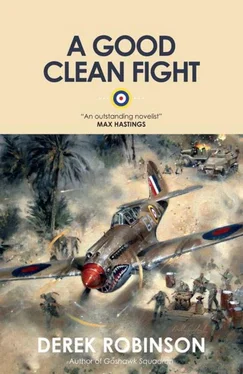They lost themselves in the crowd. “What on earth did they want?” Malplacket asked.
“Beats me. Maybe they thought they recognized me. I kept on coughing and shaking my head… Listen, I’ve had enough of all this. My ulcer’s burning.”
“Did you take my picture?”
“Yeah, yeah, I took your lousy picture.” Lester’s voice had become weak and thin, and it kept on breaking up. “Let’s get back to the goddamn car.”
It was a long walk and by now the day was very hot. Twice, Lester had to stop and rest. When they reached the ruined villa, and the Fiat was still there, he let out a long sigh of relief.
“I suggest a siesta,” Malplacket said. It sounded peculiar. They laughed.
“Feel free, friend. Suggest a siesta to Lestah.” That sounded utterly absurd. Lester laughed until his stomach muscles hurt, and he had to lean against the car. “I got news,” he said when he stopped gasping for breath. “There’s a guy upstairs.”
Malplacket thought it was a joke until Lester took out his pistol. He moved alongside Lester and looked up. Half the ceiling had collapsed when the roof caved in. Upstairs, in the tangle of broken beams and planks, just visible at the fringe of destruction, was an army boot with some bare leg attached.
“Whoever he is, he’s not doing us any harm,” Malplacket said. He felt slightly sick: too much tension, too much heat. “Why don’t we just leave him alone?”
“He’s hiding. He’s probably a deserter.” Lester’s voice was cracking up again. “Might be dangerous. Might be armed.”
“I’m sorry, old chap, I simply can’t handle another crisis before lunch. Just fix the car, quickly, so that we can go.”
“Sure.” As Lester moved forward, the boot moved back. It dislodged a dribble of stones. Lester stopped. Nobody spoke. Plaster dust sifted slowly through bars of sunlight. There was more movement above. More rubble fell.
“For Pete’s sake,” Lester said miserably. The pistol hung from his fingers like a dead thing.
A man crawled to the edge and looked down at them. He was young and small and thin. All he wore was shorts and boots. He spoke in German: the words meant nothing to them.
“You never saw us, kid,” Lester said. “And we never saw you. Now crawl back into your hole.”
With one hand the young man gripped the splintered end of a beam and he swung into space. It was a fall of about eight feet and he landed badly. He was weeping with pain, but he stumbled to his feet and raised his arms in surrender. One arm would not go all the way up. It was broken or dislocated or maybe both. Lester had not seen anyone so thin and filthy since China. What made it worse was the young man’s voice. Throughout the weeping he kept chanting the same shrill German phrase, over and over again. Lester recognized the sound of the mentally ill, a noise so full of hurt that it was unbearable. Sooner or later it would be stopped by a punch in the mouth.
Lester’s hands were shaking as he replaced the distributor cap. “Try the engine!” he called. The Fiat whirred and grumbled and would not start. Lester crossed himself. “You hypocritical bastard,” he whispered. The Fiat coughed and fired and roared, drowning out the German’s manic gabble. Lester scrambled into the car. “What’s wrong with a bit of hypocrisy, anyway?” he said.
“What?”
“Forget it. Wait!” He opened the door and threw a fistful of money. The young German expected a blow: he staggered back, tripped and fell. “Let’s go!” Lester cried.
* * *
Malplacket drove carefully through the town. “You’ve got your story now, haven’t you?” he said. “We can leave, can’t we?” Lester nodded.
They were old Benghazi hands. Finding the way out was easy. Nobody wanted to stop them. They were waved through the roadblock under the triumphal gateway. After that, it took remarkably little time to reach the turn-off where they had parted company with Lampard’s patrol. Malplacket drove into the Jebel and parked under some trees.
They ate lunch: biscuit and bully-beef. An Arab boy appeared and sold them fresh goat’s milk. “It ain’t Groppi’s,” Lester said, “but it’ll do… Jeez, I’m tired. We did it. I can’t believe we did it.” He photographed the boy, who smiled.
“I hope you took my picture when I was saluting.”
“Yeah, sure,” Lester shrugged. “I think I did.”
“If you missed that salute I shall never forgive you. Neither will Blanchtower.”
Gibbon had drilled them in the route to the rendezvous. It was simple: they drove through the foothills of the Jebel until they picked up the main camel trail that went south. It crossed the Tariq el ’Abd at a point marked by the skeletons of three camels and the fresh grave of a German soldier. From there they set the sun compass to one hundred and eighty degrees and drove on that bearing for precisely fifty kilometers into the Sahara. They reached the rendezvous by midafternoon. It looked just like the rest of the desert, and it was just as empty.
“I guess we’re early, or he’s late,” Lester said. “Or a bit of both.” They had a box of tinned food and two jerricans of water. That should be enough.
* * *
Toward sunset Malplacket built a fire as he had seen the patrol do it—fill a large can with sand and soak it with petrol—and he made a stew.
By then Lester had finished his story. He had been writing it in his head ever since they had left Benghazi, so putting it down on paper was easy. Malplacket read it as they ate.
“Splendid. Spiffing, in fact. Congratulations.”
“You really like it?”
“Yes, indeed. And Chicago will find it irresistible.”
“It zips along.”
“I enjoyed your moments of irony. Very refreshing.”
“Yeah?” Lester took the pages back. “Huh.” He flicked through them. “This is just a first draft, of course. Still kinda rough in spots.”
“Don’t lose those ironic moments, old chap. They are the little leaven that leavens the lump.” Lester raised his eyebrows. “First Corinthians, chapter four,” Malplacket said. “Feel free to use it. It’s out of copyright.”
“Thank God you’re not judging the Pulitzer. You’d give it to Fanny Farmer’s Cookbook.”
They had one blanket each, and it was not enough. They awoke, shivering, long before dawn, as a scouring wind blew sand into their hair and ears and nose and mouth.
Tea was hot but gritty. They took shelter in the Fiat and listened to the whine and moan. When the sun came up, they watched the desert floor shift and twist as the wind hustled it elsewhere.
“Goddamn weather,” Lester said. “I just hope it doesn’t louse up Lampard’s navigation.”
“Gibbon knows his job. He won the MC, remember.”
“Maybe Gibbon got wounded. Or captured.”
“In England it is a criminal offense to spread alarm and despondency. You are not only spreading it, you are digging it in.”
“I got sand in my crotch.”
Malplacket sighed. “Everyone in the desert has sand in his crotch. Some have more than others. Corporal Pocock, for instance, has a very great deal of it.”
Lester had nothing to say about that. He climbed into the back seat and began to rewrite his story.
The wind dropped at about ten o’clock. Breakfast was another stew; afterward, Malplacket was so tired that he slept in the shade of the car.
The midday sun awoke him. He felt grubby and stained, and he took a short walk to revive himself. That was a mistake. The desert looked bigger and emptier than ever.
Later, he read Lester’s second draft. “Excellent,” he said. “A vast improvement.”
Lester waited. “I took out all that ironic crap,” he said. “You notice?”
Читать дальше












